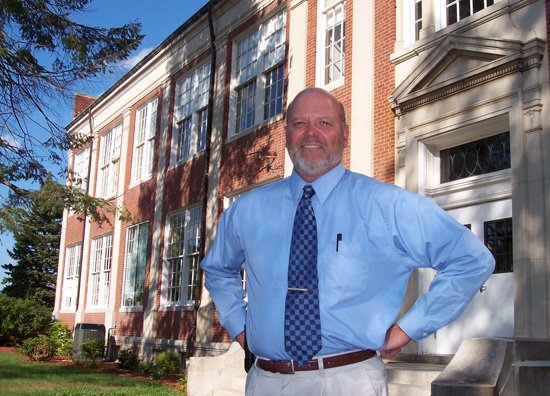Director of Physical Plant Responsible for Building Trades, Utilities, Facilities, Grounds
 |
| Cliff Ashton, director of Physical Plant, oversees 75 full-time employees and 50 contract employees from the department’s new home on Long Lane. |
| Posted 10/01/05 |
| Q: Cliff, when did you become the new director of Physical Plant and what do you think of it so far?
A: I came to Wesleyan in the middle of June 2005. The people here have been so nice and helpful getting me acclimated to the place. I look forward to a long career here. Q: What are your responsibilities? A: I’m responsible for overall operations and maintenance of the “physical plant” in other words most of the universities’ buildings including the central power plant but excluding rental properties, and the grounds and landscaping. We manage the contractors who mow the lawns in the warm weather and move the snow and spread the sand when it gets cold. Management of our utility consumption and related energy conservation initiatives are also within my scope of responsibility. To do this work, we have facility managers who monitor condition of our buildings, coordinate repair and improvement projects, and serve as our liaison with building users. We have a staff of skilled tradespersons and technicians who operate and monitor the various heating, air conditioning, electrical and plumbing systems and perform repairs as needed. Our operation is staffed 24×7 round the clock. Q: How many people work in Physical Plant? A: We have 75 full-time employees and 59 contract employees. Q: What is the mission of Physical Plant? A: Were responsible for the construction, renovation, repair, maintenance and operation of all buildings and grounds. We have 370 buildings that need to be operated in a safe, environmental manner. These buildings are valuable assets so, just like your home, we try to keep them in as good a shape as possible in view of their age with the resources we have.” Q: I imagine that can be pretty challenging. A: The challenge is what attracted me to working here. Wesleyan has several old buildings and maintaining them can be difficult due to age, historic nature and associated restrictions, obsolete systems and availability of replacement parts. Q: What do Wesleyans power bills look like? A: Our gas, oil and electric budget is $5.6 million. Of that $2.8 million is spent on electricity alone, so conserving energy is one of our biggest priorities that we keep an eye on. Q: If my office has a flickering fluorescent bulb, what do I do? A: You would call our customer service office at 685-3400. We have two operators here from 8 a.m. to 5 p.m. Monday through Friday. During off hours, calls are routed to the Power Plant. The operators fill out a work request and that goes into our computer system. The forepersons see the requests and assign a technician to fix the problem. We’ll get someone out there as soon as possible. If situation is not an emergency, it may take a few days to complete any repair. Q: What are the most common reasons Wesleyan employees call Physical Plant? A: It runs the gamut – hot, cold complaints in offices and conference rooms, plumbing repairs, lights out, broken windows, doors sticking, fire alarms. Keys are a big one. Keys break or get stuck in a lock or people lose them. Q: Is one part of the year busier than another? A: Right now when students and faculty return is one of the busiest. Reunion/commencement is another. Summer and break periods are very busy as those are our short windows of opportunity to get in to student residence areas to make repairs and do preventive maintenance. We are pretty busy throughout the year. Q: What would happen if Physical Plant closed down for just one day? A: Well, the power plant would be unattended and that would not be very safe. Repairs would not get done, an overflowing toilet would not get fixed very quickly, students who locked themselves out of their rooms would need to be let in by public safety each time. Q: How does the new Physical Plant facility on Long Lane benefit your department? A: Before we moved into the Cady School on Long Lane, Physical Plant was split into different locations on campus. The shop facilities were poor and not conducive to morale. By being consolidated under one roof, we can foster teamwork and employees have a sense of belonging. We can all think under one roof. The new shop facilities should help to improve our service delivery. Q: What were you doing before you came to Wesleyan? A: I was working at Middlesex Hospital as a director of engineering. I was managing projects, facilities, clinical engineers, the buildings, physical plant and grounds. Before that, I worked at Northeast Utilities for 18 year in various power plant facility engineering and management roles. Q: What did you study in college? A: I have a bachelors degree in mechanical engineering from Worcester Polytechnic Institute and a masters degree in mechanical engineering and masters of business administration from Rensselaer Polytechnic Institute. Im also a registered professional engineer in the state of Connecticut. Q: Do you consider yourself to be a handy-man? A: Yes. Im always fixing things around the house. My first house in New Britain was a three-family house and I worked on that quite a bit. Many years ago I worked in a machine shop. Q: What are your hobbies or interests outside of work? A: I enjoy sailing, snow and water skiing, and working on my model railroad. Ive been doing that project for about 15 years. My wife, Teri, and I have a 7-year-old daughter and 8-year-old son, and Im busy coaching my daughters soccer team and my sons basketball team. |
| By Olivia Drake, The Wesleyan Connection editor |

